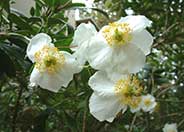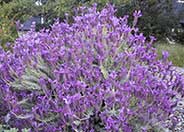
Common name:Western Redbud
Botanical name:Cercis occidentalis
This deciduous shrub ranges from 6'-20' tall and 10'-15' wide. It is desirable for its magenta spring flowers, yellow to red fall color, and dangling winter seed pods. It is tolerant of many soil types, drought and oak root fungus. It attracts hummingbirds and butterflies. The Western Redbud can be found statewide in CA in the foothills below 4500' elevations in chaparral and woodland communities.
- Cornflower Farms

Common name:Foothill Penstemon
Botanical name:Penstemon heterophyllus
This perennial will grow 1.5'-2' tall and 2'-3' wide. It has glossy, blue green foliage with flowers that vary in color and bloom from spring through early summer.

Common name:Bush Anemone
Botanical name:Carpenteria californica
This CA native is a dense, clean evergreen shrub that grows 4'-8' high and 5' wide. It is tolerant of sun or shade. It has white fragrant flowers from May through August.
-Cornflower Farms

Common name:Spanish Lavender
Botanical name:Lavandula stoechas
This dense shrub grows 2'-3' tall with blue gray foliage and deep purple flowers that have large showy bracts near the top of the spikes. It is drought tolerant . - Cornflower Farms

Common name:Bush Anemone
Botanical name:Carpenteria californica
This CA native is a dense, clean evergreen shrub that grows 4'-8' high and 5' wide. It is tolerant of sun or shade. It has white fragrant flowers from May through August.
-Cornflower Farms
Dealing With Drought
More than half of the water used at your home is for outside purposes. Studies show that on average, half of the water used outdoors is wasted. The leading cause of waste is incorrectly set and poorly managed irrigation controllers. The second biggest cause of wastage is broken irrigation equipment that goes undetected. There are a few basic things you can do to make a big difference in your water use.
Click in the green box for more information
| Designer: Bob Perry and Asso. | Native Entry Courtyard |
Photographer: GardenSoft |
Soils and Compost:
Practice grass-cycling by leaving short grass clippings on lawns after mowing, so that nutrients and organic matter are returned to the soil.
Water Saving Tip:
Mulching and adding compost to soil can minimize evaporation and help soil absorb and store water.
Integrated Pest Management:
Remove irrigation water and fertilizer from areas where you don't want weeds to grow.

